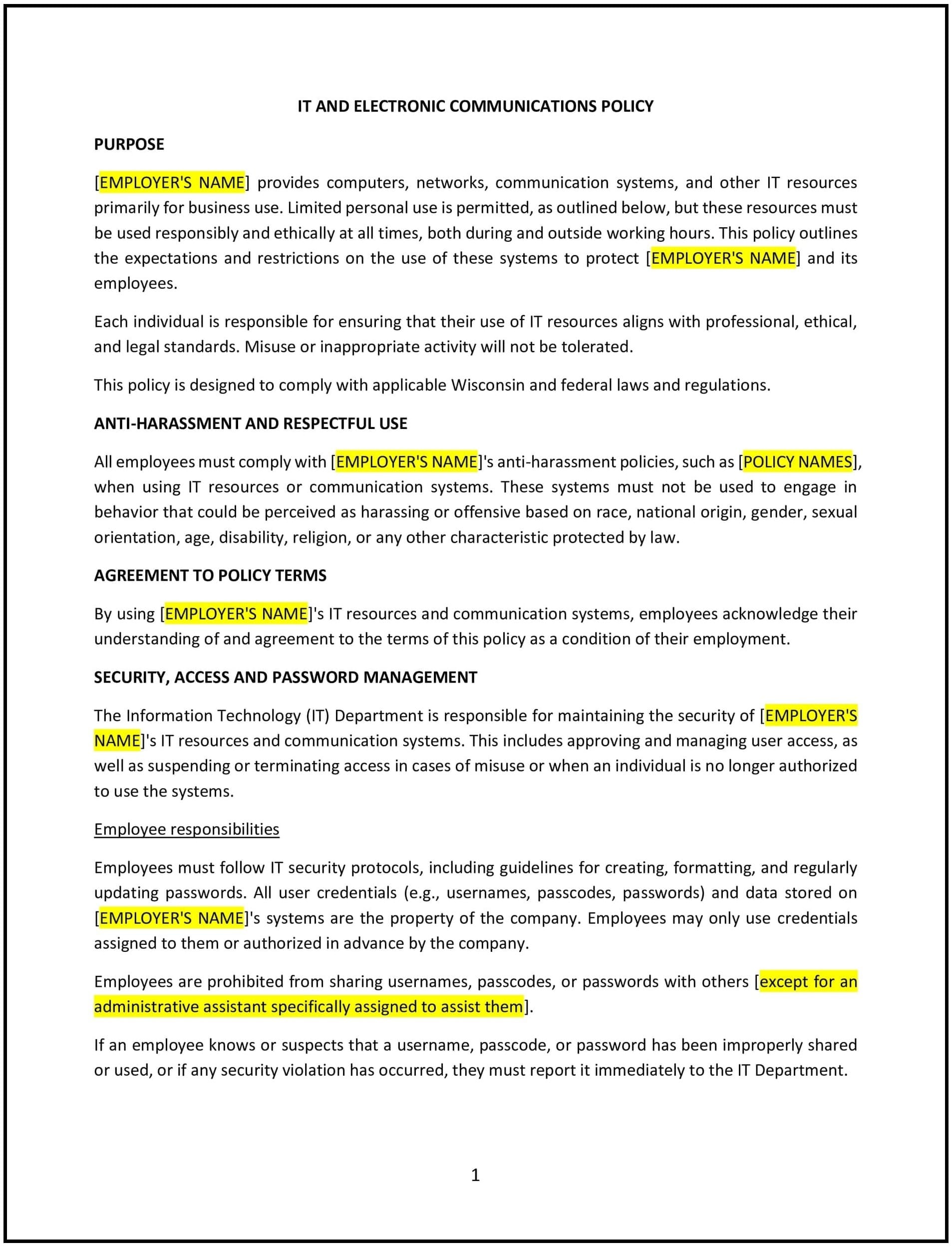IT and electronic communications policy (Wisconsin): Free template
Got contracts to review? While you're here for policies, let Cobrief make contract review effortless—start your free review now.

Customize this template for free
IT and electronic communications policy (Wisconsin)
An IT and electronic communications policy helps Wisconsin businesses establish guidelines for the appropriate use of company-owned IT systems and electronic communication tools, including email, internet access, social media, and mobile devices. This policy ensures that employees understand their responsibilities regarding data security, privacy, and acceptable use of technology resources, while minimizing the risk of cybersecurity threats, data breaches, or misuse of company assets.
By implementing this policy, businesses can protect sensitive information, enhance productivity, and support compliance with relevant laws and regulations governing electronic communication and data security.
How to use this IT and electronic communications policy (Wisconsin)
- Define acceptable use: Clearly outline the types of activities that are acceptable when using company-owned IT systems, including email, internet browsing, and mobile devices. Specify that employees are expected to use company resources primarily for business purposes and not for personal or non-work-related activities that could interfere with productivity.
- Establish security protocols: Provide guidelines for securing company devices, including the use of strong passwords, encryption, and multi-factor authentication (MFA) to protect sensitive data. Employees should be instructed to lock devices when not in use and to report any lost or stolen devices immediately.
- Define prohibited activities: List activities that are prohibited while using company IT resources, such as accessing inappropriate content, using unauthorized software, or engaging in cyberbullying or harassment. Specify that misuse of company resources can lead to disciplinary action, including termination.
- Outline communication guidelines: Establish guidelines for appropriate communication via email, messaging platforms, and social media. Encourage professional conduct, respect for others, and adherence to the company’s values. Make clear that communication should not violate company policies or expose the company to reputational risks.
- Address data privacy: Outline the company’s commitment to maintaining the privacy and confidentiality of sensitive information, including personal data, intellectual property, and customer data. Specify the company’s expectations for how employees should handle and protect data both in digital and physical formats.
- Define monitoring and auditing procedures: Explain that the company may monitor and audit the use of IT resources, including emails, internet activity, and social media interactions, to ensure compliance with the policy and protect against security risks. Make clear that employees should have no expectation of privacy when using company systems.
- Improve compliance with legal and regulatory requirements: Ensure that the policy aligns with relevant laws and regulations, such as the General Data Protection Regulation (GDPR), Health Insurance Portability and Accountability Act (HIPAA), and state-specific privacy laws.
- Establish consequences for non-compliance: Define the consequences of violating the policy, including potential disciplinary actions, which may include warnings, suspension, or termination.
- Regularly update the policy: Periodically review and update the IT and electronic communications policy to ensure it reflects new technologies, emerging security threats, and changes in laws or regulations.
Benefits of using this IT and electronic communications policy (Wisconsin)
This policy offers several benefits for Wisconsin businesses:
- Protects sensitive data: By establishing guidelines for data security and privacy, the policy helps prevent data breaches, unauthorized access, and misuse of sensitive company or customer information.
- Reduces legal and financial risks: Improving compliance with relevant privacy and security laws reduces the risk of legal penalties, lawsuits, or regulatory fines for non-compliance.
- Enhances employee productivity: By setting clear guidelines on the appropriate use of IT resources, the policy helps employees stay focused on work-related tasks and minimizes distractions or misuse of company systems.
- Safeguards the company’s reputation: A policy that encourages professional and ethical use of electronic communication tools helps prevent reputational risks associated with inappropriate content, cyberbullying, or harassment.
- Supports regulatory compliance: The policy ensures the business adheres to relevant state and federal laws regarding data security, privacy, and electronic communications, protecting the business from legal liabilities.
- Provides clarity for employees: The policy sets clear expectations for employees on the acceptable use of company IT resources, reducing confusion and potential misunderstandings related to technology use.
Tips for using this IT and electronic communications policy (Wisconsin)
- Communicate the policy clearly: Ensure that all employees are familiar with the IT and electronic communications policy and understand their responsibilities regarding the use of company technology. Provide regular training and updates on security best practices.
- Enforce policy compliance: Regularly monitor employees’ use of IT resources to ensure compliance with the policy. Address violations promptly and consistently to maintain the integrity of the policy.
- Protect company devices: Provide employees with secure, company-approved devices and tools to minimize security risks. Encourage employees to secure their devices when not in use and report any issues immediately.
- Train employees on data security: Provide training on best practices for data security, such as handling sensitive data, recognizing phishing attempts, and using strong passwords. Ensure that employees understand the potential consequences of security breaches or misuse of company resources.
- Regularly review and update the policy: Review the policy at least annually or whenever there are updates to technology or regulations. Ensure that the policy remains relevant and effective in addressing emerging risks or challenges.